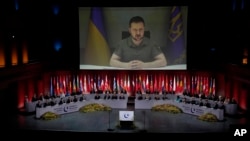On March 15, Iceland announced it would train Ukrainian naval cadets “in practical seamanship including navigation, maritime surveillance, and operations, including search and rescue.”
This Nordic island nation has less than 400,000 citizens, and is unique among North Atlantic Treaty Organization (NATO) allies, as it does not have a standing military or military supplies.
Russian Foreign Ministry spokeswoman Maria Zakharova called out Iceland for announcing what she called its “long-term plan to increase assistance to the Kyiv regime,” which she said included “financing the purchase of weapons and the training of Ukrainian armed forces fighters.”
“Iceland is among the countries whose mercenaries have travelled to Ukraine. It also trains Ukrainian military sailors on its territory,” Zakharova said.
“The oh-so 'peaceful' Iceland is thus trying to keep up with its senior allies in sponsoring Ukrainian Nazis.””
These claims are misleading.
First, Iceland has no navy. The Icelandic Coast Guard (ICG) will be training the Ukrainian sailors. The ICG is a law enforcement agency responsible for search and rescue, maritime safety, security surveillance, and law enforcement in Icelandic waters.
“The training will for the most part take place aboard Coast Guard vessels where smaller groups of cadets will receive several weeks of training,” a government press release read.
Second, there is no evidence of Icelanders joining the Ukrainian army to fight Russian aggression. Iceland has advised its citizens not to fight in Ukraine.
Iceland’s government “has no knowledge on any Icelandic citizens fighting or who have fought for the Ukrainian Armed Forces or the International Legion,” a spokesperson at the Icelandic Embassy in Washington, D.C., told Polygraph.info.
Russia has repeatedly called foreign volunteers fighting on behalf of Ukraine "mercenaries," even when those individuals have joined the International Legion of Defense of Ukraine, which was incorporated into Ukraine’s armed forces.
As Polygraph.info previously reported, the International Committee of the Red Cross, in its guidance on legal protections for combatants in a war, defines a mercenary as "a person who takes a direct part in hostilities motivated essentially by the desire for private gain.”
According to the Red Cross, "a national of a neutral State who enlists in the armed forces of a party to the conflict is not a mercenary.”
Foreign volunteers fighting in Ukraine, apart from being incorporated into Ukraine’s armed forces, also receive a salary in line with that of Ukrainian nationals.
Polygraph.info reached out to Ukraine’s Ministry of Defense to determine whether any Icelandic citizens were serving in the International Legion of Defense of Ukraine or the Ukrainian army but had not heard back by the time of publication.
Third, while Zakharova suggested that Iceland was not taking an independent foreign policy position on Ukraine but was being influenced by “a very aggressive Western community,” an annual survey released last October found that 82% of polled Icelanders favored Iceland supporting Ukraine in the war with Russia.
What’s more, 83.8% of the Icelanders surveyed oppose any international cooperation between Iceland and Russia.
Reflecting that majority view, Iceland’s government has strongly condemned “Russia's illegal invasion of Ukraine” and expressed “full solidarity with Ukraine and its people.”
Yet only 35.8% of respondents favored giving Ukraine direct military support, including by training soldiers, providing munitions, or transporting munitions, while 38.9% were opposed. However, in the same annual survey released a year earlier, in 2022, 52% of respondents opposed direct military support to Ukraine, while only 21.3% were in favor, indicating support for such assistance is growing.
Iceland has provided logistical support to Ukraine, including chartering cargo planes to transport military supplies and equipment from other NATO members to Ukraine.
Iceland has donated a fully equipped mobile field hospital to Ukraine, provided winter gear to Ukrainian servicemen, and financed and delivered ten fuel trucks for the Ukrainian military, as well as helped purchase fuel.
Iceland participated in a U.K.-led training project for Ukrainian field medics and led an explosive ordnance disposal training program in Lithuania for the Ukrainian military.
Iceland also participates in the IT Coalition of the Ukraine Defense Contact Group, providing Ukraine telecommunications and cyber security support.
Fourth, to justify the invasion, Russian propaganda has fabricated and propagated the false narrative that Ukraine’s government is ruled by Nazis. Polygraph.info and others repeatedly exposed those falsehoods.
Hundreds of scholars of war, genocide, Nazism, and World War II condemned Russia’s “cynical abuse of the term genocide, the memory of World War II and the Holocaust, and the equation of the Ukrainian state with the Nazi regime to justify its unprovoked aggression.”
Fifth, Russia has reportedly recruited and even tricked foreign nationals from Cuba, Nepal, India, and African countries to fight in Ukraine.
Reports indicate that many of the foreign men who signed up to fight for Russia were motivated by economic hardship at home.
For example, for many of the thousands of Nepalese fighters believed to have been recruited to fight on Russia’s side in the war, money and fast-tracked Russian citizenship were the primary motivators.
One recruit told CNN that he did not actually support Russia’s invasion of Ukraine.
In some instances, those men were deployed with the Wagner Group, a Russian state-funded private military company that has employed thousands of mercenaries to fight in Ukraine.
In Ukraine and elsewhere, Wagner mercenaries have allegedly engaged in systematic human rights violations, including mass killings.





